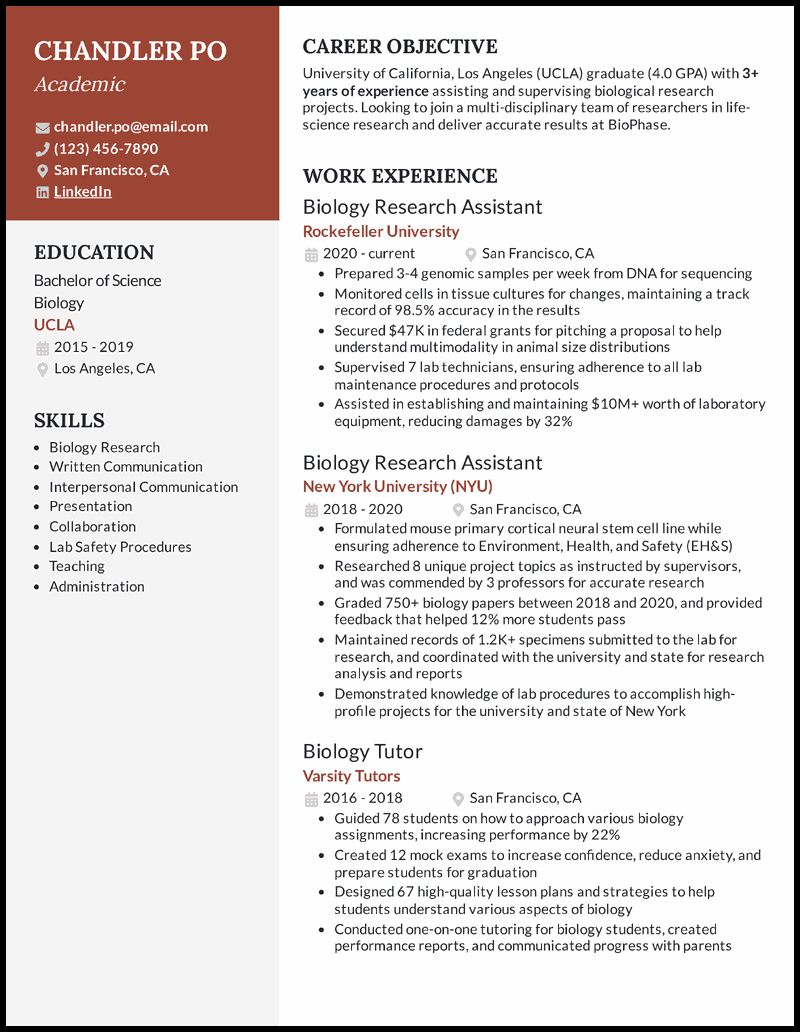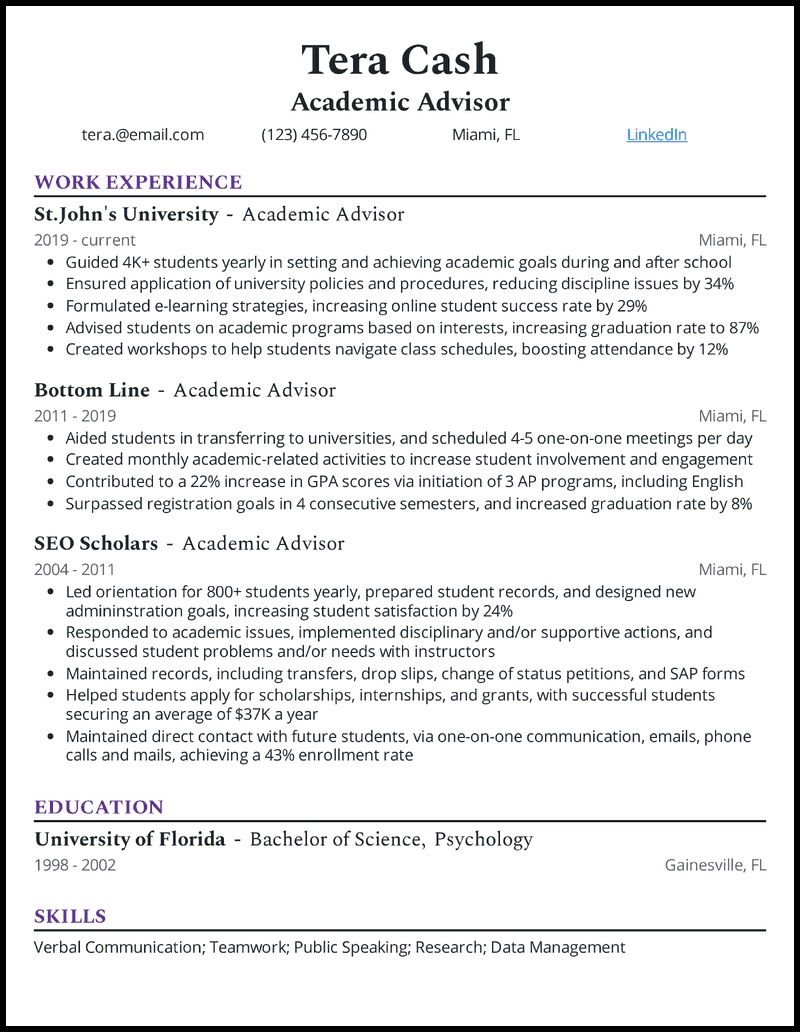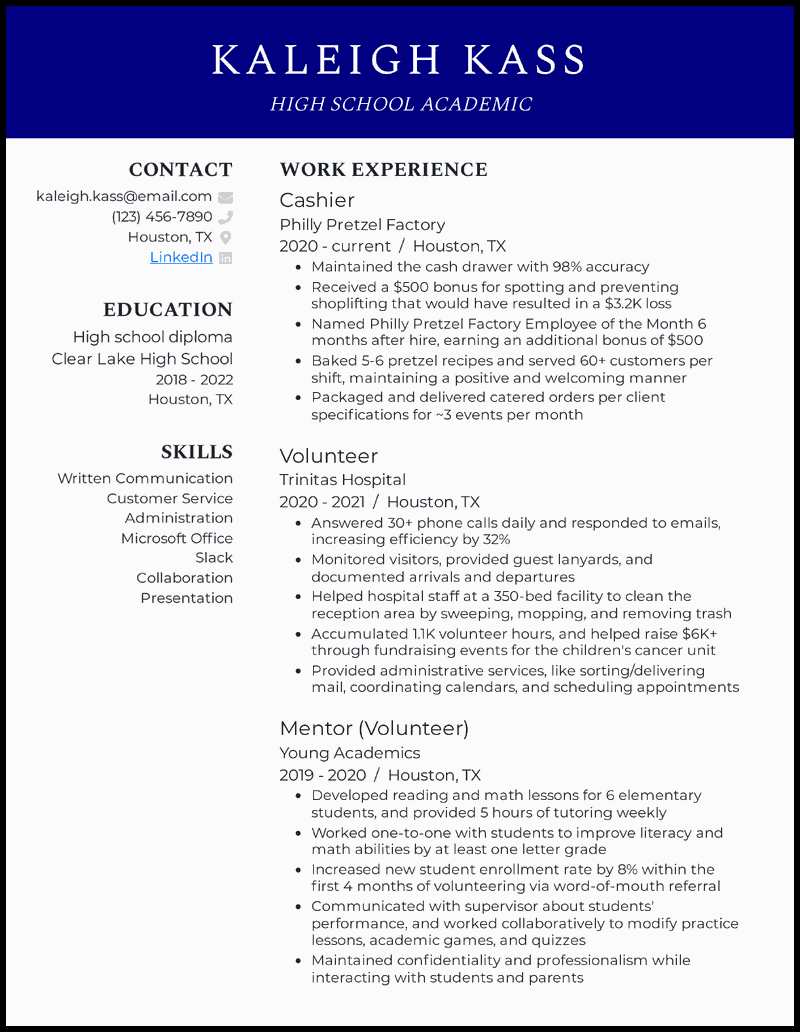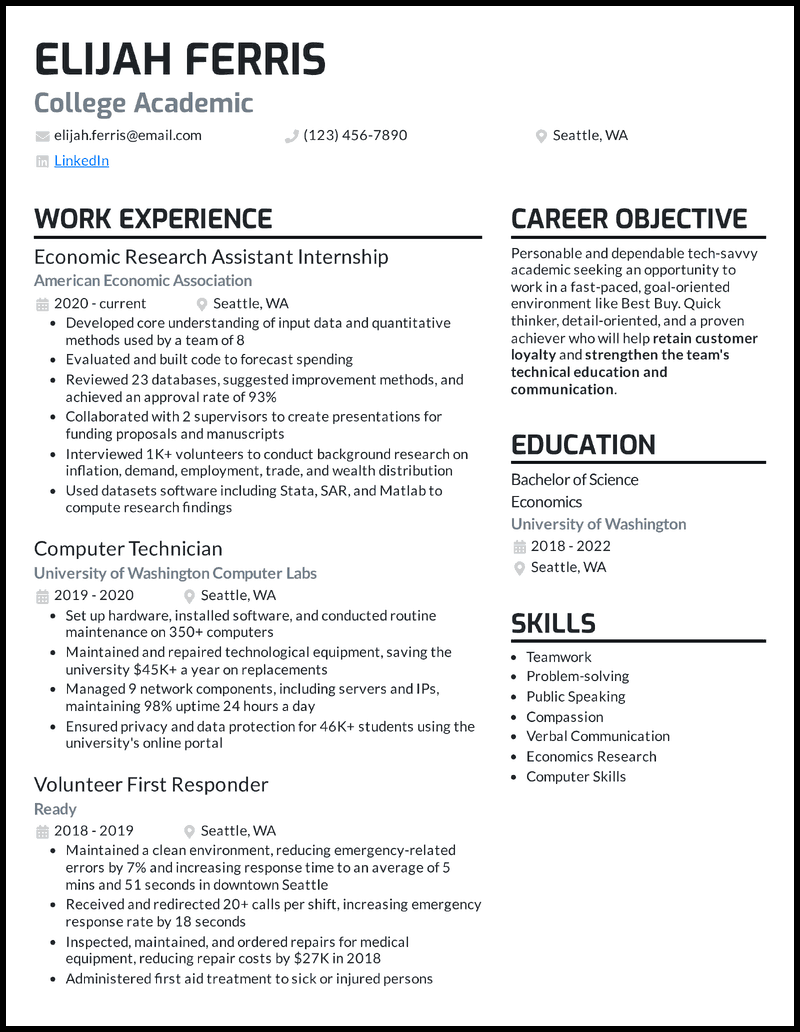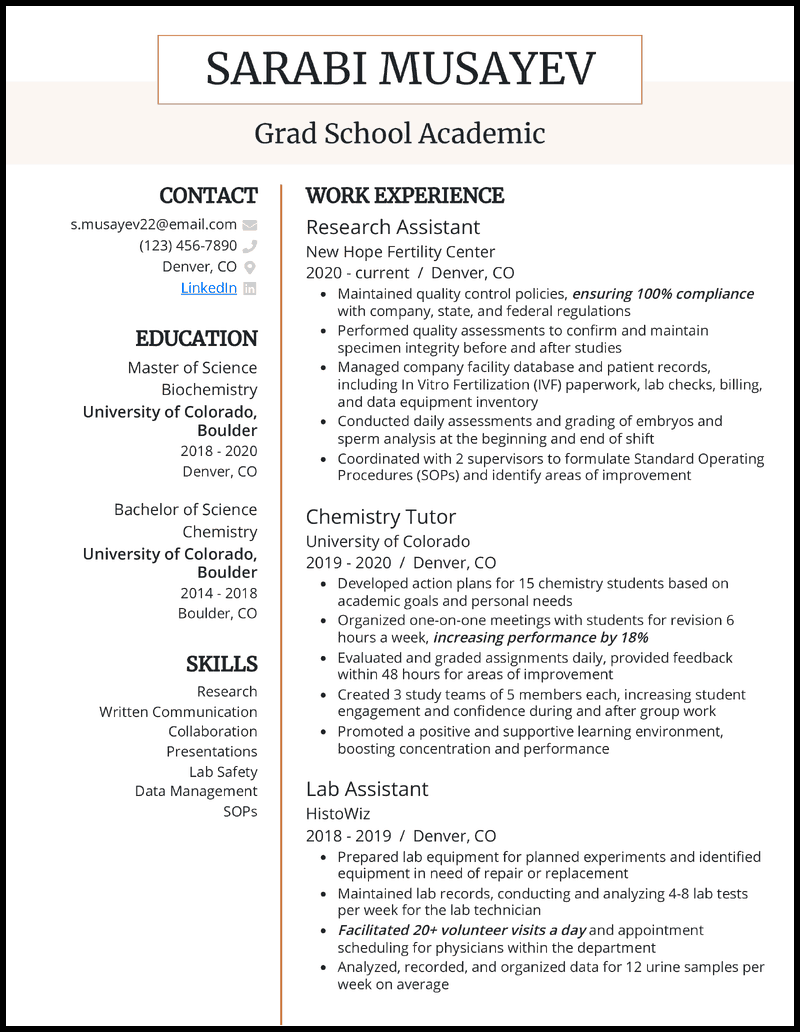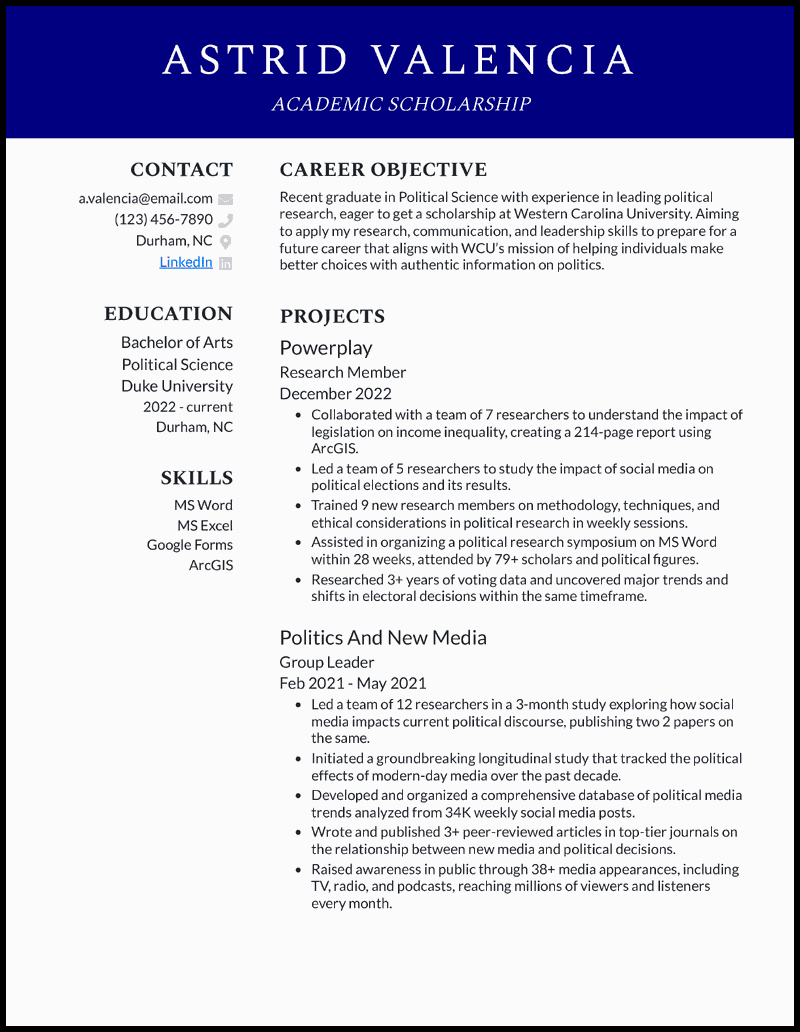If you’re applying to a Ph.D. program, looking to be a research assistant, or planning to teach at the college level, employers may request that you submit a CV instead. There are some key differences between a CV and a resume you’ll want to know about.
If you’re still looking to generate a cover letter or write a resume, stick with us. We’ve reviewed hundreds of academic resumes and highlighted common mistakes job seekers make. With this information, we’ve created the perfect resume for applicants in various academic fields and practices.
Whether you’re looking for a job as an academic advisor or wanting to advance your research or student career, we’ll show you the best nine academic resume samples that worked in 2026.
Why this resume works
- Consider including a resume objective to highlight some of your key achievements. Remember, this section should be a snapshot of what recruiters need to know about you. For that reason, don’t be too humble.
- Be specific and to the point while conveying your best.
- Customize your objective by mentioning the target business by name and sprinkling in some relevant keywords from the job description.
- Recruiters want to interview people they believe can positively impact the company.
- Use industry-specific terms in your academic resume and pepper it with solid metrics to demonstrate your impact.
- For example, saying you “prepared 3-4 genomic samples per week from DNA for sequencing” shows your industry familiarity while using numbers to offer an easy-to-read glimpse of your duties.
Why this resume works
- Quantifying your impact provides a numerical overview of what recruiters can expect from you.
- If you struggle to find ways to express those metrics on your academic advisor resume, ask yourself:
- How many students did I advise?
- Did I help students obtain scholarship money? If so, how much?
- Did I get positive performance reviews?
- Don’t exaggerate your results or resume skills, hoping to impress recruiters. It will break their trust and put too much pressure on you if hired.
See more academic advisor resumes >
Why this resume works
- When writing your high school academic resume, try to be concise without leaving out important information. Using words like ‘successfully’ or ‘skillfully’ will only take up extra space and may be considered filler.
- In the academic world, your resume should shout, “organized!”
- We suggest using the reverse-chronological resume format for an easy-to-read, logical flow.
- Reverse-chronological formatting orders your work experience and education from the most recent to the oldest, so employers get to the most relevant stuff first.
- Double-check your resume work experience bullet points to ensure they take less than three lines and stick to between 20 to 200 characters per bullet.
See more high school academic resumes >
Why this resume works
- The most critical sections in your college academic resume are the contact information, work experience, skills, and education.
- It’s helpful to mention your proficiency in any industry-specific tool or skill. While at it, quantify your achievements to show your impact.
- For example, “Inspected, maintained, and ordered repairs for medical equipment, reducing repair costs by $27K in 2018” proves that you won’t need a lot of training and will add value right away.
See more college academic resumes >
Why this resume works
- What better way to add punch to your academic coach resume than by spotlighting your Certified Youth, Parent & Family Coach certification offered by the World Coach Institute?
- This won’t just underscore your commitment to continual learning and adherence to international coaching standards. It also reflects your expertise in dealing with familial and youth-related situations, a skill crucial for academic mentorship. Other certifications you could flaunt in your piece are Instructional Coaching Penn GSE and ALC Academic Life Coaching.
Why this resume works
- For an academic library resume, don’t fret over insufficient library-oriented job experience. Proficiencies mastered in unrelated roles and relevant to the open role can be your saving grace.
- Suppose you once served as a receptionist where you handled social media, managed documents, or used tools like Microsoft Teams to better communicate with internal teams. Transferable skills learned from these experiences can prove useful in your quest for the library role.
Why this resume works
- For an academic advisor no experience resume, it’s highly important to list any past-related work or project experience. Since you’re an entry-level applicant, colleges know you’re not an expert but will keep an eye out for certificates and skills in using student management platforms like GradesFirst.
- If you have any project experience with researching fields of study or guiding students toward their future, add them at all costs! Any amount of experience with improving a student’s learning ability and grades will do wonders too.
Why this resume works
- Your grad school academic resume should highlight your dependability and commitment to excellence.
- You can achieve this by writing action statements:
- For example, “Developed action plans for 15 chemistry students based on academic goals and personal needs”
- Accentuate your power statements with a neat yet stylish resume template.
- Lastly, polish it off with a hint of subtle color for pop while remaining professional, and don’t be afraid to have just a touch of white space.
See more grad school academic resumes >
Why this resume works
- In a scholarship academic resume, it’s crucial to add leadership, communication, and teamwork qualities
- Add any projects that you’ve been a part of or have volunteered for. Since you’re only a graduate, academic institutions know you won’t have much experience to showcase. As long as your resume contains coherent future goals backed by relevant experience, you’ll be good to go!
Related resume guides
How to Write an Academic Resume

Summary
Write a results-driven academic resume highlighting education, research, skills, and publications to impress recruiters.
When you write your academic resume, you should aim to achieve several things: compel with your story, impress with expertise, and prove that you have the skills and determination to succeed in the position you’re applying for.
Above all, write a resume tailored to the academia space, as recruiters will be paying attention to that.
In this section, we’ll tell you the most essential sections you need for your academic resume and share inspiring resume examples to help you craft an application that will get you on top of the stack.

Choose the right resume format for your academic resume
Use a reverse-chronological format to list experience, volunteer efforts, and personal and academic projects. If you’re between early high school or post-graduate school, we bet you have academic and personal projects, like research, internships, mentoring, volunteering, etc. that you can talk about in reverse-chronological order.
Functional and combo formats are tempting, but a reverse timeline will give recruiters the best insight into your skills and what you offer.

Write a career objective if you’re looking for your first role out of school
Briefly explain how the skills you’ve gained from your academic background (UCLA graduate with 3+ years of assisting and supervising biological research) couple well with the role (collaborate with a multi-disciplinarian team in life-science research) you’re seeking at a specific organization.
As you read a company’s job ad, what qualities and traits are important for the role that resonate with you? Let that be your springboard to write a customized career objective.
Example
Passionate graduate with a BA in English Literature from the University of Michigan, seeking a research assistant role at the University of California, Berkeley. Skilled in academic writing, data collection, and peer collaboration. Completed a senior thesis on American postmodern narratives and assisted in organizing departmental conferences. Eager to contribute to Berkeley’s Department of English through analytical thinking, communication skills, and deep enthusiasm for literary scholarship.

Emphasize your education
Especially if pursuing higher education, list the school, degree, and year you earned the degree in your academic resume. If you’re still studying, set the date to the anticipated graduation year.
List relevant courses to your degree plan. For example, if you’re a biology major wanting a research assistant position, Biology of Mammalian Cells and Tissues would be a relevant course. You can also include a high GPA as well as honors, awards, and affiliations.
Example
Bachelor of Arts in Psychology
University of North Carolina at Chapel Hill
Chapel Hill, NC
2020-2024
GPA: 3.8
Relevant coursework: Research Methods in Psychology, Cognitive Neuroscience
Senior Thesis: “The Impact of Virtual Learning on Student Motivation Post-COVID”

Focus on accomplishments, not on job duties
Share results whether the work you’ve done has been paid work, volunteer work, or even class projects. For example, maybe you volunteered to mentor students at a tutor center. If you’ve been part of a practical project, you can as well include your research statement.
Rather than say you developed lessons or communicated with parents, discuss outcomes that speak to your abilities. “Worked one on one with students to improve math scores by one letter grade” or “increased student enrollment by 8% with new referral program” speaks volumes about your work!
These kinds of bullet points also make a great launching pad for story-telling in your academic cover letter.
Examples:
- Conducted a semester-long qualitative study on student burnout, interviewing 25+ peers and analyzing findings using NVivo; findings presented at an undergraduate research symposium.
- Served as a teaching assistant for “Intro to Sociology,” leading weekly discussion groups for 32 students and grading written assignments with detailed feedback.
- Completed a summer internship at the American Psychological Association, contributing to a database of 512 peer-reviewed articles and assisting in literature reviews.

Showcase your skills
Your skills should include hard and soft competencies in research, writing, collaboration, and teaching. You’re better off with a mix of technical and interpersonal capabilities specific to the academic landscape because they present you as a career-ready candidate.
Examples of great academic skills:
- Academic writing & editing
- Data analysis (SPSS, R, Excel)
- Research design
- Public speaking
- Literature reviews
- Time management
- Project coordination
- Critical thinking
- Teaching assistance
- Conference preparation

Include publications
Do you have anything published in your name? It could also be an article or an opinion piece you co-authored. Include those in a section dedicated to publications. As you list them, consistently use a format such as MLA, Chicago, or APA.
Examples:
- Smith, J. (2023). “Narrative Identity in Contemporary Memoirs.” Undergraduate Journal of Literary Studies, 14(1), 22-34.
- Doe, A., & Smith, J. (2024). “Analyzing Online Learning Outcomes Among College Freshmen.” Journal of Educational Psychology Research, 10(2), 98–115.

Add your awards and honors
Showcasing awards and honors presents you as a committed candidate willing to go the extra mile to achieve results. Whether it is a research grant, an academic scholarship, or excellence-based recognitions, they add value to your application.
Examples:
- Dean’s List, University of Florida – Fall 2021, Spring 2022, Fall 2023
- Undergraduate Research Grant, University of Texas – Awarded $1,500 for senior thesis project (2024)
- Phi Beta Kappa Honor Society – Inducted May 2024
Academic Resume FAQs

It’s your job-seeking document in the academia space detailing your teaching experience, academic affiliations, educational background, publications, research, and honors. It can also be used to apply for scholarships, grants, or research programs.
There are apparent differences between an academic and professional resume. While an academic resume is longer and typically goes over a page, a professional resume is limited to one page unless you are experienced and have many accomplishments. Another key difference is the focus of each resume. An academic resume highlights research projects, publications, and other relevant activities. On the other hand, a professional resume focuses on relevant work experience, skills, and accomplishments relevant to the specific position the candidate is applying for.




![9 Academic Resume Examples [& Templates]](https://beamjobs.wpenginepowered.com/wp-content/uploads/2023/03/academic-resume-example.png)
